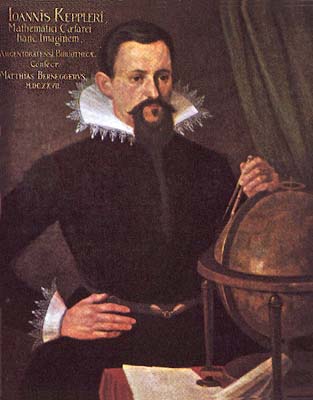In the interplay between quantitative observation and theoretical construction that characterizes the development of modern science, we have
seen that Brahe was the master of the first but was deficient in the second. The next great
development in the history of astronomy was the theoretical intuition of Johannes Kepler (1571-1630), a German who went to Prague to become Brahe's assistant.

Brahe's Data and Kepler
Kepler and Brahe did not get along well. Brahe apparently mistrusted Kepler, fearing that his bright young assistant
might eclipse him as the premier astronomer of his day. He therefore let Kepler see only part of his voluminous data.
He set Kepler the task of understanding the orbit of the planet Mars, which was particularly troublesome. It is believed
that part of the motivation for giving the Mars problem to Kepler was that it was difficult, and Brahe hoped it would
occupy Kepler while Brahe worked on his theory of the Solar System. In a supreme irony, it was precisely the Martian
data that allowed Kepler to formulate the correct laws of planetary motion, thus eventually achieving a place in the
development of astronomy far surpassing that of Brahe.
Kepler and the Elliptical Orbits
Unlike Brahe, Kepler believed firmly in the Copernican system. In retrospect, the reason that the orbit of Mars was particularly difficult was
that Copernicus had correctly placed the Sun at the center of the Solar System, but had erred in assuming the orbits of the planets to be circles.
Thus, in the Copernican theory epicycles were still required to explain the details of planetary motion.
It fell to Kepler to provide the final piece of the puzzle: after a long struggle, in which he tried mightily to
avoid his eventual conclusion, Kepler was forced finally to the realization that the orbits of the planets were
not the circles demanded by Aristotle and assumed implicitly by Copernicus, but were instead the
"flattened circles" that geometers call ellipses.

The planetary orbits are only slightly elliptical and are not as flattened as in this
example.
The irony noted above lies in the realization that the difficulties with the Martian orbit derive precisely
from the fact that the orbit of Mars was the most elliptical of the planets for which Brahe had extensive data. Thus Brahe had unwittingly given
Kepler the very part of his data that would allow Kepler to eventually formulate the correct theory of the Solar System and thereby to banish
Brahe's own theory!
11/2011